The Institute of Popular Music (IPM) at the University of Liverpool is hosting the 15th Biennial IASPM International Conference, from 13th to 17th July 2009. The full programme can be found on the conference website.
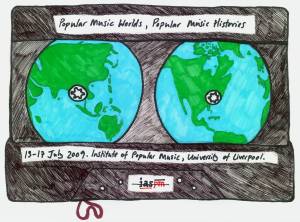
Music and Arts in Action
Music and Arts in Action (MAiA) is a new, peer-reviewed, open-access journal that focuses on individual and group encounters with the arts in a practical social context, as well as theoretical work examining music and the arts as active components of human experience. Continue reading
Borderless Ethnomusicologies: SEM 2009 Annual Meeting
SEM 2009 Annual Meeting in Mexico City
November 19-22, 2009
The Society for Ethnomusicology will hold its 54th annual meeting on November 19-22, 2009, at the Meliã México Reforma Hotel in Mexico City and at the National Center for the Arts in nearby Coyoacán. This year’s meeting, titled “Borderless Ethnomusicologies,” will feature more than 400 presentations, as well as a variety of concerts and other special events hosted by arts institutions in Mexico City .
In conjunction with the 2009 meeting, there will be a pre-conference symposium, “The Past, Present, and Future of Musical Research in Mexico ,” on November 18 at the School of Music of the National Autonomous University of Mexico.
Visit www.ethnomusicology.org for more information about the meeting, hotel accommodations, and online registration.
Gerd Bayer (2009) Heavy Metal Music in Britain
Gerd Bayer
Heavy Metal Music in Britain
(Surrey: Ashgate 2009)
Review by Michelle Phillipov

Heavy metal is one of popular music’s most enduring and commercially successful genres. Emerging in the late 1960s, metal has since undergone numerous transformations, from massive arena spectacles to obscure underground subgenres. Despite its longevity and sustained popularity over the past four decades, metal has enjoyed only limited scholarly attention. It was not until the early 1990s — over 20 years after the genre’s inception — that a significant body of scholarship began to emerge. But even then, the critical literature on metal has remained noticeably less than for other major musical genres and, significantly, it has also remained noticeably less favourable. Metal has been too often dismissed as conservative and reactionary; its apparent substitution of escapism for political commitment has contributed to a dominant stereotype of the genre as less empowering, less culturally significant and less worthy of study than other more straightforwardly ‘progressive’ alternatives. Continue reading
Sean Stroud (2008) The Defence of Tradition in Brazilian Popular Music
Sean Stroud
The Defence of Tradition in Brazilian Popular Music
(Hampshire: Ashgate, 2008)
Review by Alvaro Neder
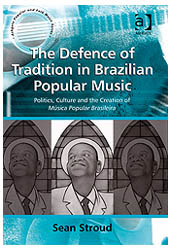
Stroud’s study “examines how notions of what constitutes Brazilian popular music have been constructed over a period of forty years or so since the mid 1960s” (p. 1). Under the “distinct impression” that “the influence of an essentially conservative group of writers and journalists . . . continues to exert a particular influence on public perceptions of a tradition of national popular music” (ibid.), the author aims to consider the role of these and other actors (the record industry, the broadcasting industry, the state, academics and individual researchers) who have shaped current notions of what is understood as Brazilian popular music, and what isn’t. One of his primary intentions is “to identify the influence of those actors in delineating the parameters of Brazilian popular music, and more particularly the construction of a tradition within the wider sphere of popular music as a whole, that is, Música Popular Brasileira (MPB), the socio/cultural/musical movement that has dominated the artistic scene in Brazil since the mid 1960s” (pp.1-2). Continue reading
ARP 2009 – Producing Recorded Performances: Capture or Design?
Call For Papers – Deadline Extended to 30th April 2009
The Fifth Annual Art of Record Production Conference
will be hosted by the Division of Music and Sound,
The Atrium, University of Glamorgan, Cardiff, S. Wales
on November 13th – 15th 2009.
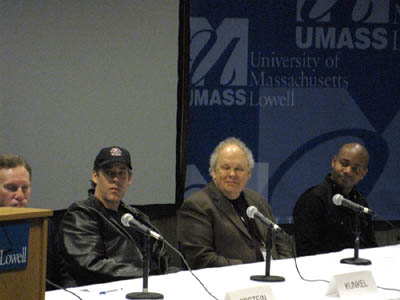
[Steven Epstein, Nate Kunkel, Bob Ludwig, Paul Miller at 2008 ARP Conference]
Continue reading
Mi pueblo me hace cantar
La nueva canción latinoamericana: A 21st Century View
A Conference Hosted by the University of East Anglia
11th-12th September 2009
Call for Papers
Mi pueblo me hace cantar is a two-day multidisciplinary conference that brings together leading researchers in the field of Latin American music and politics to examine the impact and legacy of the new song movement, throughout Latin America, from a twenty-first century perspective. Continue reading
Sysmus09
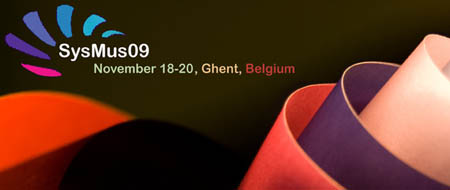
IPEM – Institute for Psychoacoustics and Electronic Music
Ghent, Belgium
November 18-20
Sysmus09 is a conference of students of Systematic Musicology with focus on the ongoing research developed by PhD and advanced Master students from the SysMus discipline and other disciplines engaged in music research. It is a privileged forum to disseminate new research initiatives and create international networks of research. In this second edition we will discuss and explore the potential and problems of the interdisciplinary tasks that challenges all spheres of SysMus and most part of the research in music. Continue reading
Dark Side of the Tune: Popular Music and Violence
Bruce Johnson and Martin Cloonan
Dark Side of the Tune: Popular Music and Violence
(Adlershot: Ashgate 2008)
Review by Carlo Nardi
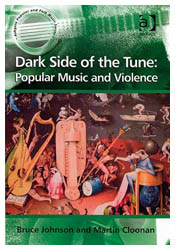
In his book The ragas of North India, Walter Kaufmann reports a conversation he had in 1934 with an eminent classical musician in then Bombay. On the basis that a rāga performed at a wrong time is inauspicious, the old man expressed his sense of frustration in these terms: “Do you know that you people in the West will soon experience a most terrible disaster? And do you know why? […] Because you people in the West abuse music and perform it at wrong times and occasions! You play funeral marches and sing dirges when there is no funeral and no cause for sadness, you sing love songs and spring songs when there is neither love nor spring, you play nocturnes during the day, wedding music when there is no wedding. How long – he roared – will the universe tolerate this abuse of music, music, mind you, a most sacred thing?” (Kaufmann 1968, p. 18). Continue reading
Twenty Years After: A Review Essay of Musicological Identities
Michael W. Morse
Twenty Years After: A Review Essay of Musicological Identities (1)
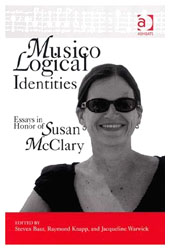
Steven Baur, Raymond Knapp, and Jacqueline C. Warwick (eds)
Musicological Identities: Essays in Honor of Susan McClary
(Aldershot, England; Burlington, VT: Ashgate, 2009) (2)
i
It has been nearly twenty years since the publication of Susan McClary’s provocative Feminine Endings. The appearance of a festschrift, with contributions from her most reliable students and acolytes, presents a suitable occasion to rethink the contribution to musicology of McClary and her school. I believe, first of all, that we can speak straightforwardly of a ‘school’. There are a number of important orientations, principles if you will, that unite these authors in their diversity, marking them together ideologically, and apart methodologically from other versions of musicology; they form a major strand of the so-called New Musicology® (3). Historically, perhaps first among these principles were regular and fervent proclamations of ideological distance from (and hence disinterest in) ‘traditional’ musicology and its outmoded scholarly paradigms; such edicts often took the form of tabular lists of the virtues of ‘us’ and the flaws of ‘them’ (4). Musicology’s paradigm—the singular is deliberate—is considered methodologically superseded because it ignored social context in favour of a chimerical abstract called ‘the music itself’, and morally outdated because it espoused elitist canons of white male privilege, intellectually as well as musically. Continue reading
